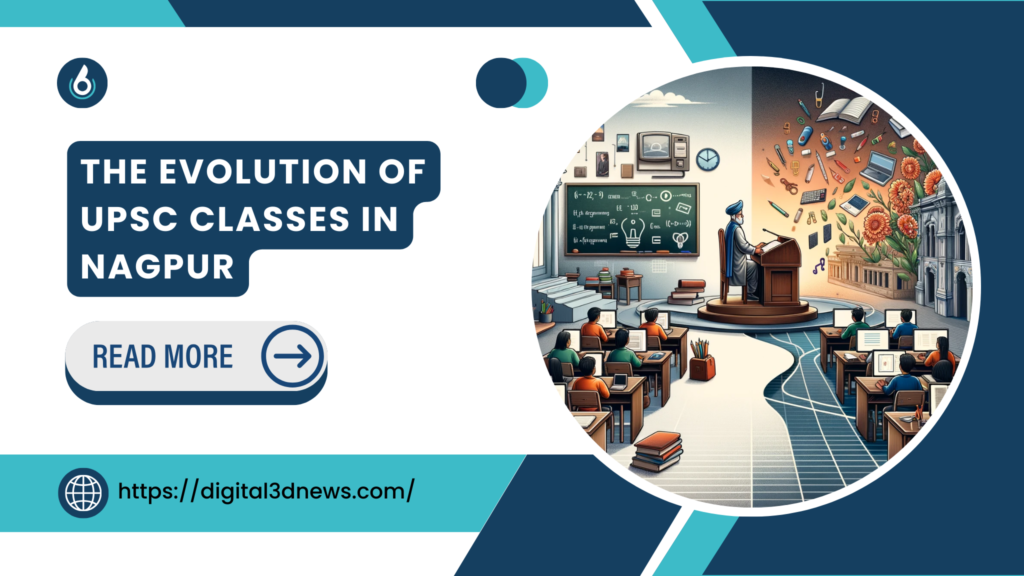Introduction
Nagpur, a central hub of education and culture in India, has been at the forefront of adapting to the evolving landscape of UPSC coaching. The Union Public Service Commission (UPSC) exam, one of the most prestigious in India, demands not only academic rigor but also a strategic approach to preparation. This article traces the transformation of UPSC coaching in Nagpur, highlighting how shifts in educational methods have impacted aspirants over the years.
The Genesis of UPSC Coaching in Nagpur
In the early stages, UPSC coaching in Nagpur was a nascent concept, primarily focused on a few institutes offering classroom-based teaching. These institutes were the pioneers, setting the foundation for what would become a flourishing industry. The approach was straightforward – educators with expertise in various subjects of the UPSC syllabus would impart knowledge through face-to-face interaction. Study materials, mostly in printed form, were disseminated, and students gathered in these traditional classrooms to learn and prepare.
The Traditional Classroom Model
These classrooms were characterized by their simplistic approach: a teacher, a blackboard, a set of chalks, and rows of eager students. The teaching methods were largely didactic, with a focus on completing the syllabus, memorizing facts, and solving previous year question papers.

The Role of Mentorship
In this phase, the role of the teacher extended beyond just imparting knowledge. They were mentors, guiding students through the daunting journey of UPSC preparation, offering moral support and motivation. This personal touch was a hallmark of the traditional classroom setup.
The Challenge of Resources
While these classes offered personalized attention, they were limited in terms of resources. Students had access only to the knowledge and notes provided by their teachers, with little exposure to the vast array of resources available outside the classroom walls. This limitation was particularly felt in subjects like Current Affairs, where staying updated with the latest information was crucial.
The Advent of Online Learning
The early 2000s marked the beginning of a new era in UPSC coaching in Nagpur. The advent of the internet and digital technology brought a seismic shift in the way UPSC coaching was delivered and received.
The Onset of E-learning
Online platforms began to emerge, offering video lectures, interactive sessions, and a plethora of digital resources. This change democratized UPSC coaching, making it accessible to a wider audience beyond the geographical confines of Nagpur.
The Digital Classroom
The digital classroom was a stark contrast to the traditional setting. It offered flexibility, allowing students to learn at their own pace and on their own time. Video lectures could be paused, replayed, and accessed from anywhere, breaking the shackles of time and place.
The Resource Revolution
The biggest advantage of online learning was the exponential increase in available resources. Students could now access lectures from top educators across India, use various apps for preparation, and stay updated with the latest information through online news portals and forums.
Challenges of the Digital Shift
However, this shift was not without challenges. The abundance of resources sometimes led to information overload. Self-discipline became crucial, as the lack of a structured classroom environment meant students had to motivate themselves. Additionally, the lack of face-to-face interaction with educators posed a challenge for those who relied on personal mentorship.
The Hybrid Model: Best of Both Worlds
As the decade progressed, a new trend emerged in Nagpur – the hybrid model of UPSC coaching. This model sought to combine the best aspects of both traditional and online learning methods.
Integration of Classroom and Online Learning
The hybrid model offered a blend of physical classroom sessions for core concepts and online modules for supplementary learning. This approach provided the structure of a classroom while also offering the flexibility of online resources.
Enhanced Learning Experience
The integration of digital tools in traditional settings enhanced the learning experience. Interactive elements like online quizzes, discussion forums, and virtual reality experiences made learning more engaging.
The Personal Touch in the Digital Age
Coaching institutes began to use technology to personalize the learning experience. AI-based tools were introduced to track student progress and offer customized study plans. This personalization ensured that each student’s unique learning needs were met.
Beyond Academics: Holistic Preparation
As the coaching landscape evolved, there was a growing recognition of the need for a holistic approach to UPSC preparation. Coaching institutes in Nagpur started to focus not only on academics but also on the overall development of aspirants.
Personality Development
Personality development sessions became a staple part of coaching. These sessions aimed to prepare students for the personality test (interview) of the UPSC exam, focusing on communication skills, confidence building, and ethics.
Stress Management and Wellness
Recognizing the high stress levels among UPSC aspirants, coaching institutes in Nagpur started incorporating stress management sessions into their curriculum. Workshops on meditation, yoga, and time management were organized to help students maintain a healthy mental and physical balance. These sessions emphasized the importance of mental well-being in achieving long-term success.
Current Affairs and Real-World Application
To keep pace with the dynamic nature of the UPSC syllabus, particularly in current affairs, coaching centers started integrating real-world scenario analysis into their teaching methods. This approach helped students understand and analyze current events from multiple perspectives, a crucial skill for the UPSC examination.
The Role of Mock Tests and Feedback
Regular mock tests became a critical component of the coaching process. These tests simulated the UPSC exam environment, helping students to build stamina and improve time management.
Personalized Feedback
The evolution of coaching also saw a shift towards more personalized feedback mechanisms. Digital tools were employed to provide detailed analysis of mock test performances, enabling students to identify their strengths and weaknesses.
The Evolution of Test Series
Test series evolved to become more comprehensive and aligned with the latest UPSC trends. They included a mix of subject-specific tests and full-length papers, covering the entire spectrum of the syllabus.
Technology Integration in UPSC Coaching
Technology played a pivotal role in transforming UPSC coaching in Nagpur. From smart classrooms to AI-driven study aids, technology integration became a hallmark of modern coaching methods.
Smart Classrooms
Smart classrooms equipped with digital boards, projectors, and internet connectivity became the norm. These classrooms provided an interactive and immersive learning experience, making complex topics easier to understand.
AI-Driven Learning
AI-driven platforms offered personalized learning experiences, adapting to the individual learning pace and style of each student. These platforms used data analytics to identify weak areas and suggest targeted study material.
Online Test Platforms
Online test platforms revolutionized the way aspirants practiced for the UPSC exam. These platforms offered a vast repository of practice questions, instant evaluations, and performance tracking.
The Emergence of Specialized Coaching
As the competition intensified, there was a rise in specialized coaching for different parts of the UPSC exam – prelims, mains, and interview.
Prelims-Specific Coaching
Coaching for the preliminary exam became more focused, with special emphasis on objective-type questions, time management, and elimination techniques.
Mains and Optional Subjects
Coaching for the mains examination saw a shift towards developing answer writing skills, critical thinking, and in-depth understanding of optional subjects.
Interview Preparation
Specialized sessions for interview preparation, including mock interviews by former UPSC panel members, became increasingly popular. These sessions focused on developing a confident and honest presentation of oneself.
Success Stories and Testimonials
The journey of UPSC coaching in Nagpur is best exemplified by the success stories of its aspirants. Testimonials from successful candidates provided insights into effective strategies and the impact of various coaching methods.
Learning from Success
In-depth interviews with top rankers revealed the importance of a balanced approach, combining self-study with guided coaching. These stories served as a source of motivation and a roadmap for future aspirants.
The Diversity of Approaches
Success stories highlighted the diversity of approaches to UPSC preparation. While some credited their success to the structured environment of classroom coaching, others emphasized the role of online resources and self-study.
The Future of UPSC Coaching in Nagpur
Looking ahead, the landscape of UPSC coaching in Nagpur is poised for further innovation and growth.
Embracing New Technologies
The future of UPSC coaching is likely to witness greater integration of cutting-edge technologies like virtual reality for immersive learning experiences and machine learning algorithms for predictive analysis of exam trends.
The Rise of Collaborative Learning
Collaborative learning platforms, where aspirants can learn from each other and from experts across the country, are expected to gain popularity. These platforms will facilitate peer learning, group discussions, and sharing of best practices.
The Importance of Continuous Learning
The evolving nature of the UPSC exam necessitates a continuous learning approach. Coaching institutes are expected to focus more on developing lifelong learning habits among aspirants, preparing them not just for the exam but for their future roles as civil servants.
Conclusion
The evolution of UPSC coaching in Nagpur is a reflection of the broader changes in the educational landscape of India. From traditional classroom methods to digital learning and now to an integrated approach, the journey has been marked by constant adaptation and innovation. As the demand for UPSC coaching continues to grow, Nagpur remains at the forefront, embracing new methodologies and technologies to empower the next generation of civil servants.
For individuals keen on delving deeper and acquiring additional understanding of what the Dnyanjyoti Education Best UPSC & MPSC Classes In Nagpur Maharashtra offers, I recommend visiting their website for more information.
Here, you can find detailed information about their courses, faculty, success stories, and much more, providing a comprehensive view of how they guide and prepare their students for the prestigious IAS exam.



